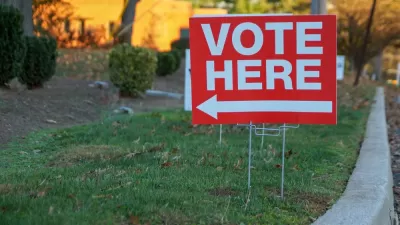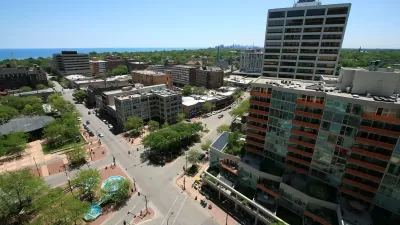A sluggish housing market has stemmed the flow of young parents into Chicago's suburbs, putting pressure on city officials to make public schools better, John Pletz reports.
Traditionally, many property-owning couples in Chicago make the move out to the suburbs once their children reach school-age. As Pletz explains, "During the last quarter-century, thousands of people flooded annually into suburban DuPage and Will counties, making them among the fastest-growing jurisdictions in the country." But the recent collapse of the housing market has changed that, keeping families in the city and turning public attention toward performance of Chicago Public Schools (CPS).
"There's a huge opportunity... to attract and keep families in the system who otherwise would have left," says Timothy Knowles, director of the University of Chicago Urban Education Institute. And while the force of public scrutiny may help Mayor Rahm Emanuel in his effort to overhaul the system, annual deficits of roughly half a billion dollars loom large over city officials.
Meanwhile, concerned parents have taken a more active role in ensuring the quality of their children's education, Pletz writes: "Activist parents raise money, expectations and standards... Nonprofit groups such as Friends of Coonley routinely raise more than $100,000 annually for extra teachers, equipment and programs such as ecology." In addition, competition for selective elementary schools has skyrocketed over the past four years.
"Parents are trying to navigate CPS and get the best education for their kids as possible," says Alderman Ameya Pawar. "At some point the market is going to come back. We need to figure out how to keep people here and get new people moving in. We've probably got three to five years."
FULL STORY: Slowdown in home sales means parents face questions about city schools

Planetizen Federal Action Tracker
A weekly monitor of how Trump’s orders and actions are impacting planners and planning in America.

San Francisco's School District Spent $105M To Build Affordable Housing for Teachers — And That's Just the Beginning
SFUSD joins a growing list of school districts using their land holdings to address housing affordability challenges faced by their own employees.

The Tiny, Adorable $7,000 Car Turning Japan Onto EVs
The single seat Mibot charges from a regular plug as quickly as an iPad, and is about half the price of an average EV.

Austin's First Single Stair Apartment Building is Officially Underway
Eliminating the requirement for two staircases in multi-story residential buildings lets developers use smaller lots and more flexible designs to create denser housing.

Atlanta Bus System Redesign Will Nearly Triple Access
MARTA's Next Gen Bus Network will retool over 100 bus routes, expand frequent service.

Toronto Condo Sales Drop 75%
In two of Canada’s most expensive cities, more condos were built than ever — and sales are plummeting.
Urban Design for Planners 1: Software Tools
This six-course series explores essential urban design concepts using open source software and equips planners with the tools they need to participate fully in the urban design process.
Planning for Universal Design
Learn the tools for implementing Universal Design in planning regulations.
Smith Gee Studio
City of Charlotte
City of Camden Redevelopment Agency
City of Astoria
Transportation Research & Education Center (TREC) at Portland State University
US High Speed Rail Association
City of Camden Redevelopment Agency
Municipality of Princeton (NJ)





























